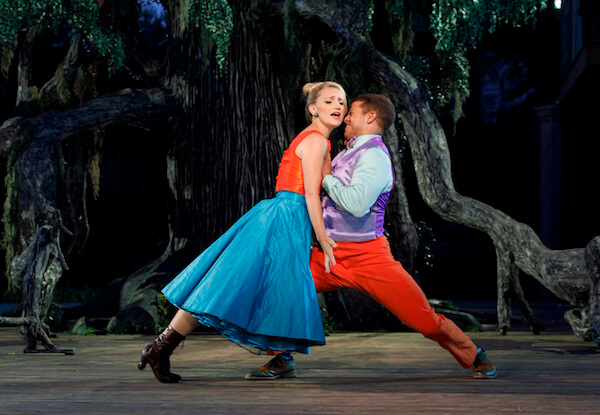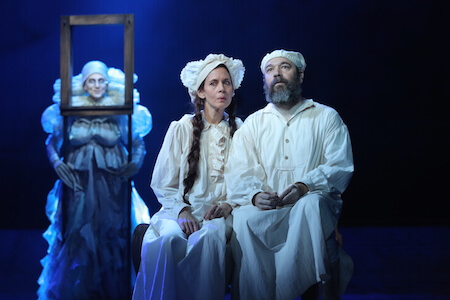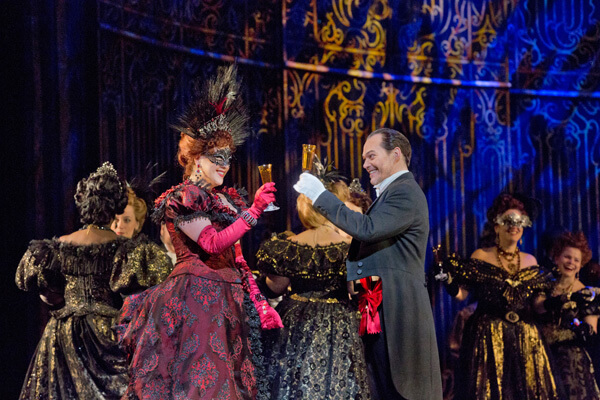Annaleigh Ashford and Alex Hernandez in the Public Theater’s production of Shakespeare’s “A Midsummer Night’s Dream” at Central Park through August 13. | JOAN MARCUS
Any discontent you feel about our nation’s current state of affairs will get at least a brief respite at the glorious summer treat currently on the stage in Central Park. The Public Theater’s heartfelt, hilarious production of “A Midsummer Night’s Dream” is the perfect prescription for ailing spirits in trying times.
Directed by Lear deBessonet, the production is an explosion of comedy and poetry as the four intertwining tales unfold in Athens and the surrounding woods. Theseus and Hippolyta prepare their wedding after he defeated her in battle. The lovers Lysander and Hermia seek refuge in the woods when Hermia is faced with having to marry Demetrius. Helena, once Hermia’s closest friend, is in love with Demetrius and spills the beans. Demetrius heads out to stop the elopement with Helena in hot pursuit, hoping against hope to finally snag Demetrius. Meanwhile, Oberon, king of the fairies, is at odds with his wife Titania over a changeling boy, and he plays a joke on her to get even. In the middle of all of this, a company of local laborers rehearses a tragic play, “Pyramus and Thisbe,” which they hope to present for the wedding. There are mixed up love potions, mistaken identities, animal transformations, song, and dance — in fact, everything needed for midsummer madness.
The play is one of the best known in the Shakespeare canon, so the challenge for a director is to interject new surprises without compromising the familiar. DeBessonet achieves that marvelously and subtly, with a very contemporary take on the comedy as well as detailed attention to every character that is as fresh and welcome as the cool breezes that filled the park at the performance I saw. The juxtaposition of elegance and fart jokes, poetry and pratfalls is perfectly calibrated to make the audience fall in love with this play all over again.
A divine Shakespeare romp in the park; a god-awful absurdity in LIC
Much credit for the success of this production goes to the spectacular cast deBesonnet has assembled. This is not a political play, but all of the women are stronger than they are often portrayed. It’s such a pleasure, for example, to see Phylicia Rashad, as Titania, return to comedy. After Titania falls in love with Bottom, who has been transformed into an ass, she finds a way to get back at Oberon for instigating the practical joke. De’adre Aziza as Hippoloyta is equally her own woman who, though beaten in battle by Theseus, has lost none of her strength of personality. Her interchanges with Bhavesh Patel as Theseus are the richest I’ve seen in many productions of this piece.
As for the lovers, Shalita Grant as Hermia is a spitfire who, though little, as the joke goes, is nonetheless a mighty match for all comers in defense of her love for Lysander. Annaleigh Ashford as Helena gives yet another unforgettable comic performance, mining the role for every bit of silliness. Yet she is also a sweet — and often confused — girl in the throes of love. When she finally wins Demetrius, her response is perfect. Kyle Beltran and Alex Hernandez as Lysander and Demetrius, respectively, are both terrific, equally adept at the language and the physical comedy.
The “Pyramus and Thisbe” performed by the mechanicals is easily the funniest I’ve ever seen, peppered with shameless and irresistible comic turns. The humor here is always the amateurishness of the actors, but it takes skill to do it well. Notably, Austin Durant as the lion does a bit with Thisbe’s mantle that rivals Bette Midler’s turkey dinner in “Hello, Dolly!” It’s classic shtick that works every time. Jeff Hiller as Flute virtually walks away with the show as he discovers his inner Thisbe. Danny Burstein as Bottom is also perfect, radiating charm and boyish enthusiasm and never missing a comic opportunity. Setting all the action in motion is Kristine Nielsen as Puck. It’s not a traditional choice, to be sure, but Nielsen’s unerring comic gifts come to the fore, making her appealing, mischievous, and loveable.
Every moment has been realized for the maximum effectiveness, and if you are not smitten with each of these characters by the final, exuberant dance, then I’m sorry for you.
The wonderful set is by David Rockwell, lit with sensitivity and a clever use of color by Tyler Micoleau. Clint Ramos’ costumes are witty, wonderful, and often over-the-top, particularly for Theseus, Hippolyta, Oberon, and Titania. The original music by Justin Levine sets just the right antic mood, and Marcelle Davies-Lashley’s singing offers a perfect note of jazz to the proceedings.
“‘Garden of Delights,” at the Plaxall Gallery in Long Island City through August 13, is, sadly, misguided, self-indulgent, and incoherent. It’s not that Fernando Arrabal’s play has nothing to say about passion, the cost of love, and the animalistic nature of human experience, but this production, under the guidance of “theater maker” Maria Swisher, fails because it makes no effort to connect to the audience. Instead, it is a three-hours-plus assault devoid of underlying vision, trading in shallow theatricality with pretensions of gravitas.
Arrabal’s play comes out of Antonin Artaud’s Theatre of Cruelty movement and his own Panic Movement, which were intended to be confronting and assaultive. To succeed on these terms, the audience must first form a connection to the characters, to be drawn in. Swisher is completely at sea with this. True, it’s very difficult to make the theoretical theatrical, but others have done it with engaging artistry. Here, we have a series of set pieces in an enormous gallery space that are mostly screaming, random, unfocused acts. I’m actually fascinated by the theories of Artaud, who sought to trap his audiences within the drama. Audiences who are never enrolled in the conceit, however, simply feel trapped, unable to either engage or escape.
The play is ostensibly inspired by a Hieronymus Bosch painting from about 1500, which is often interpreted as representing Heaven, Hell, mortality, and damnation. It is not the first time the painting has inspired theatrical presentation. It was turned into a fascinating dance piece by Martha Clarke in 2009, but that worked because it had an organizing vision. Not so here, where the story has been changed to focus on a reclusive actress, Lais, who seeks love and connection, first with Zenon, a character that embodies raging id, and then with the romantic Teloc, a mysterious and sadistic man. Oh, and her childhood best friend Miharca is around for some girl-on-girl smooching and fighting.
The cast may be committed to whatever it is they’re doing, but it really isn’t acting so much as bellowing, keening, hurting each other (badly), and running around the cavernous space. There is absolutely no character development, and the actors just seem lost. Swisher, as Mihraca, attacks the role like a frenzied junior varsity field hockey player, all naked aggression devoid of any nuance.
The point of this mode of theater, theoretically, is to wear down the audience, basically to beat them into a catharsis. (Artuad’s theories, have never been fully realized in productions, and have been challenged by artists such as the legendary theorist and director Jerzy Grotowski as being unworkable and anti-theatrical.) Productions like this may work in an academic setting. For commercial audiences, lacking any intellectual frame of reference for the theoretical, the assault on the senses ends up for naught.
A MIDSUMMER NIGHT’S DREAM | Delacorte Theater, Central Park | Through Aug. 13: Tue.-Sun. at 8 p.m. | Free; ticket info at publictheater.org | Two hrs., 40 mins., with intermission
GARDEN OF DELIGHTS | Plaxall Gallery, 5-25 46th Ave., btwn. Fifth St. & Vernon Blvd., Long Island City | Through Aug. 13: Wed.-Sun. at 8 p.m. | $15-$25; dirtcontained.com | Three hrs., 15 mins., with intermission



































